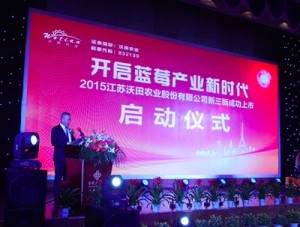China: Blueberry company becomes first to hit stock market
Jiangsu Richland Agriculture Corp has become the first Chinese blueberry company to be successfully listed on the country’s stock market, and now plans to build a ‘high quality industry chain’ and achieve a year-round supply.
Richland was listed on China’s new National Equities Exchanges & Quotations (NEEQ) on March 16, also making it the first agricultural company based in the northeastern city of Lianyungang to gain a listing.
NEEQ, also known as the ‘New Third Board’, is a national share transfer system for qualified small and medium-sized enterprises.
Regulated by the China Securities Regulatory Commission (CSRC), the NEEQ is China’s third national stock exchange market, alongside the Shenzhen Stock Exchange (SZSE) and Shanghai Stock Exchange (SSE).
Richland CEO Zhang Xiuhe told www.freshfruitportal.com the public listing on the New Third Board was a milestone in the blueberry company’s long-term plans of eventually landing on the SZSE or SSE in the next three years once profitability had increased.
“Richland’s public listing is a great opportunity for the company to connect with a much larger information and capital exchange platform,” he said.
“It’s exciting news for all players in the Chinese blueberry industry. However, our strategic plan does not stop there.”
Xiuhe said Richland’s long-term focus had three elements: excel in planting, make progress in building cold chain storage, and integrate the company’s blueberry supply chain.
“Our first goal, which was to produce superior blueberries by excelling in the planting stage, has been achieved. Secondly, we are in the process of developing more comprehensive cold chain storage facilities in order to cover the whole cold chain process of our products.
“The final aim is to build up a high quality blueberry industry chain and achieve year-round blueberry supply [with imports]. Furthermore, we’d like to develop new products within the blueberry industry as part of our plan to further integrate the supply chain in order to maximize productivity.
“Building a modern agricultural enterprise with Chinese characteristics – that is Richland’s dream.”
Earlier harvest season
The company derives much of its confidence from its strong commitment to blueberry cultivation, having invested more than CNY300 million (US$48 million) in developing plantations since its founding in April 2010.
The company’s business includes sales of fresh blueberries, processing, sales of seedlings, and blueberry picking farms, covering an area of 10,000mu (670 hectares).
Richland’s flagship product line, Bluebaby, is a well-known brand in its home province of Jiangsu, and the only blueberry brand that China currently exports.
Zhang said the varieties the company grew were Duke (early season northern highbush), Bluecrop (mid-late season northern highbush), Legacy (late season southern highbush), and Brigitta, which he said are ideal for growing in northern China.
“The Lianyungang area lies in the transition zone between northern and southern China, which gave rise to good performance from both northern highbush and southern highbush varieties.”
Richland has also managed to move the harvest season forward a couple of months compared to much of the country to early April through its solar greenhouses and cold frames.
Zhang estimates the production capacity in 2015 is around 1,000 metric tons (MT), but he expected this to increase rapidly since many plants had not yet reached full productivity. He said it could reach 7,000MT within a few years.
Increased public scrutiny
Now it is a public listed enterprise focusing on premium fresh produce, Richland’s blueberry production and processing conditions are likely to be subject to more rigorous scrutiny.
In order to improve soil conditions, Zhang said soil from northeastern China has been brought down, which contains 5-8% organic matter.
“Even when fertilizers are needed, we would use specially mixed liquid fertilizers to ensure quality standards,” he said.
Aside from its careful soil selection, Richland has paid much attention to the origin of its water supply. According to Zhang, the water used in Richland’s blueberry farms is high quality water from the mountains near Lianyungang.
With the irrigation, Richland has employed the highly efficient drip irrigation system in order to stay environmental friendly.
At the moment, the firm is actively exploring new sourcing channels, including retailer chains, inter-city distribution and e-commerce.
“We have established a sizable sales system and strong marketing networks that are compatible with our production size,” Zhang said.
“We are also working with established local distributors in numerous major cities such as Beijing and Shanghai to create a comprehensive marketing model.”
Fresh Fruit Portal
04/10/2015






